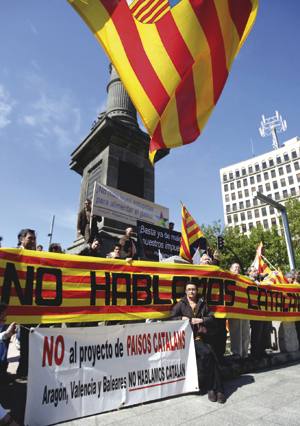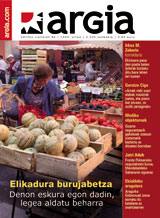The Sun enters the East
- The Government of Aragon has invented the linguistic filigree because it does not want to recognise that the language spoken in the List of Ponent (in Catalan) is the western Catalan language. In the bill it has been baptized as an “oriental Aragonese”. Neither the University of Zaragoza, nor the School Council, nor the Aragonese Council of Languages have approved the accentuated appointment.

“If you bring me a scientific report that says that Eastern Aragonese is spoken in Benavarri (Baixa Ribagorça), we will talk. Today, no one – neither the university nor the international scientific community – doubts that what is spoken there is Catalan, except for some pseudoscientific or sasilinguistic group”. The Mayor of Benavarri, the socialist Alfredo Sancho, is a professor and representative at the School Council of Aragon. The Council discussed the law on languages and Sancho tabled an amendment against the law. The draft proposed by the Government of Aragon was rejected by the majority of the opposition.
The Government of Aragon asked the School Council only for its opinion on chapter 5 of the draft. This chapter deals with the teaching of languages, and the government thought that the School Council would not look at what languages were called. But the law has many weaknesses and Sancho has corrected them to taste. To start with, “Why doesn’t it say exactly what languages to teach?” The criticism is clear and clear: “How do we teach the language, if we don’t know which language we are talking to?”
Secondly, the Mayor of Benavarri said that the law must “guarantee scientific rigor”, and departs from the criteria of universal philology, since the bill calls Aragonese languages the languages that the philologists call Aragonese and Catalan.
Thirdly, although Chapter 5 refers to “language teaching”, it does not refer to “teacher training, accreditation or certification”. Fourthly, “it is not said what certificates the students will have at the end of the education”. Until now, the student studying in Catalan was awarded the level B (medium) certificate issued by the General Directorate of Linguistic Policy of Catalonia.
Sancho got the majority of the School Council to vote against Chapter 5. Representatives of trade unions, associations of fathers and mothers, educational innovation movements and representatives of the people voted against. The pp of the peoples and the Aragon Party of the Couple did not vote. The draft was voted on by representatives of the administration, private employers and employers of the concerted schools.
The next meeting of the School Council was attended by the Minister of Education, Universities, Culture and Sport of the Government of Aragon, María Dolores Serrat. Born in Ripoll (Girona) in 1955, he is a talking Catalan and is the most responsible for the section that drives the law of languages. In response to Alfredo Sancho’s question, he said that it was not a question of creating a “philological debate”, which he spoke “central Catalan”, different from what is spoken in the List of Aragonese and which he wanted to call “as in Valencia they call Valencian”. And he said the law had created “family problems.”
The point is that the law, in addition to changing the name of Catalan, creates confusion with the Aragonese. Aragonese is the language spoken in northern Aragon and has suffered a sharp decline in social use.
An academy for the two languages
“The law is a way of denying the identity of the two languages. With a shot he throws two birds: he denies the unity of the Aragonese, because he divides it into several languages; and he denies Catalan, which is the language that most fascinates them.” Ramón Sistac, born in Camporrells (Huesca), is a member of the Department of Philology of the Institut d’Estudis Catalans (IEC) and director of the language section of the Ribagorzans Study Centre. “To say that the Aragonese languages are spoken is to say nothing: to distort the languages and bring them to the level of the destination”.
The law provides for an academy for the Aragonese languages. According to Sistac, “this is a pressure on IEC. It would have competences in all the territories where Catalan is spoken and these competences are granted by the Spanish State. It would be dealt with outside the State, but in Aragon the competences of the language academy are held by IEC. IEC is not a Catalan but a State institution.”
The Government of Aragon has tried to reason with haste about the intention of the new academy of language. That is to say, it wants to prevent an academy of another autonomous community from having competence in Aragon. Sistac recalls: “Obviously, they have also been forgotten that La Real Academia Española is an external institution and it would be a great stupidity if someone in Aragon dictated rules about Spanish.”
However, according to Sistac, “the greatest barbarity of the law is that academia would not be formed by academics but by politicians, at least thus it can be concluded with reading the draft”.
Linguistic politicisation
The experts who have spoken to El Temps consider the origin and intent of the law to be eminently political. Sistac says two things have to be taken into account. On the one hand, against the Catalan campaign of the PP: war recognized with all the paraphernalia, artillery, aviation and marine in the Valencian country, the Balearic Islands, Catalonia – ruling on the immersion system – and now in Aragon.
For his part, Sistac referred to the pressure of the Aragonese Party (PAR) in the Western List: “The pp would like to go on tiptoe. They could have worked without the law coming into force, but PARE wants blood and fresh meat. They are tightened by the PARE’s most extremists and do not know how to liberate them from that union.”
Alfredo Sancho feels the hand of the Aragonese Party: “There is surely political pressure from the most radical branch of the PA and PP of Aragon. They don't want to know anything about Catalan. It is the same name that fascinated them.”
For sociolinguistics Natxo Sorolla, “the most important objective is to move the debate away from the main topic, that is, the main topic is that the whole population should be bilingual, and they are discussing the name of the language.”
Now the situation is more serious, as in the Western List the Catalan shows the symptoms of the chronic disease. According to Sorolla, “we are in a socio-linguistic transition: According to the survey carried out by the Government of Aragon in 2003, in the List of Aragon 88% knew Catalan.” In the Western List, most of the territories are rural, they don't have immigrants, they have gone abroad. “Thanks to this, Catalan has become the street language,” said Sorolla. But that's being lost to make Catalan. “New studies with children and young people say that Catalan is only used among Catalan speakers and not always among them. In other words, linguistic substitution is taking place, as has been seen in different areas of Alicante and Northern Catalonia. It is occurring for several reasons: loss of prestige (caused by doubts about the name of the language), lack of presence in teaching, lack of presence in the media and the choice of Spanish as a language of use in the street by speakers of other languages”.
For all these reasons, the answer in the List of Aragon has been forceful. All the associations defending the language have moved and have remembered the data showing the weakness of Catalan. The Cultural Association of Matarranya, Ribagorzans Study Center, Institut d’Estudis del Baix Cinca and Cultural Initiative of the Gaza Strip make a statement: “In order for Catalan to remain a good of our counties, it is necessary that the institutions accept the language and, above all, compulsory education must ensure that all the inhabitants of these counties know Catalan and Spanish. Only the conscious policy of alphabetizing students in Catalan and Spanish will save the good that is weak.”
The University of Zaragoza, the Aragonese Council of Languages, the City Council of Zaragoza and several municipalities of the List of Aragonese have demonstrated against the law prepared by the Government. Ramon Sistac believes there will be more responses. “When a right is taken away, you understand it. First there was nothing, but as a step forward has been taken in teaching in schools, there will now be an answer.” The mayor of Benavarri has complained that the language has been re-politicized in the municipality. “The law of languages is always handled by the casings, not by the head. But if we shake the alert, we know what can happen.”
The Catalan linguist Carme Junyent died last September. We have followed closely what he said about language policy here, hoping that we will ever dare to implement some of his proposals. I was behaving without burnings. Many examples have been gathered in this journal: ARGIA... [+]
Frantsesa da nagusi, frantses instituzioetan. Haatik, urtez urte, erakunde publikoetan ere lekua egiten hasi dira euskara, korsikera edota bretoiera. Hemen, horren adibide ditugu, Ortzaizeko, Urruñako, Hendaiako edota Urepeleko herriko kontseiluak, baita Hirigune Elkargoa... [+]























